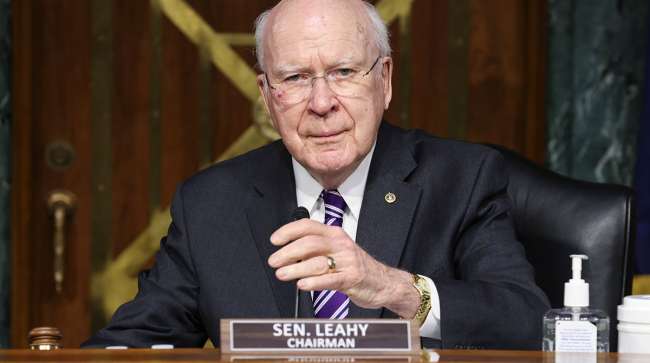Senior Reporter
Senate Funding Leader Endorses Biden’s Infrastructure Plan

[Stay on top of transportation news: Get TTNews in your inbox.]
Concerns among some lawmakers regarding climate change and freight connectivity would be addressed by President Joe Biden’s $2.25 trillion infrastructure plan, the U.S. Senate’s funding leader said April 20.
Sen. Patrick Leahy (D-Vt.), chairman of that chamber’s Appropriations Committee, pointed to the legislation’s potential environmental benefits while delivering an endorsement of the president’s comprehensive infrastructure pitch to Congress, called the American Jobs Plan.
“It will invest in our people and in research and development,” Leahy said during a committee hearing that featured members of the president’s Cabinet. “And it will incentivize the development and implementation of climate-friendly technologies and construction that will, at last, begin to chip away at the long-ignored climate issue that is simply the greatest universal challenge of our time.
“The reality of climate change can no longer be ignored. We now have the opportunity to take a step toward mitigating our carbon footprint, and to make our infrastructure more resilient to the challenges ahead. It is not a question of whether or not we should take this opportunity; it is necessary to our future that we do,” added the chairman.
While Leahy and other Democrats said they would respond to urgent calls for action on climate change, senior Republicans on the panel proposed focusing primarily on infrastructure legislation that targets modes, such as planes, trains and automobiles, as well as the aviation sector.
“I believe most people associate [infrastructure] with roads, bridges, airports, transportation systems, water systems, and the like,” said Sen. Richard Shelby (R-Ala.), the committee’s ranking member. “The administration’s proposal, on the other hand, is so broad and ambiguous that it seems there is little, if anything, they do not consider infrastructure.”
Leahy’s sentiment was echoed by Transportation Secretary Pete Buttigieg, who pointed to the White House’s proposals aimed at upgrading and modernizing nearly every aspect of the country’s mobility grid. Also, the president’s plan would rebuild networks to be able to withstand the impact of severe weather events, and expand access to broadband internet.
As he put it, “Our proposed resilience investments would support projects across America that reinforce, upgrade or realign existing transportation infrastructure to better withstand extreme weather events and other effects of climate change.”
The American Jobs Plan is going to modernize the way Americans live, starting with the roads we drive on. pic.twitter.com/0mLP5sXvlZ — Secretary Pete Buttigieg (@SecretaryPete) April 20, 2021
“The truth is that every infrastructure decision is already, inevitably a climate decision as well,” the secretary added.
Commerce Secretary Gina Raimondo prompted senators to strengthen the functions and sustainability of supply chains. Doing so, she explained, would ensure more critical goods are manufactured domestically, potentially leading to a boost in the workforce. She said the president’s plan would propose investments in semiconductor manufacturing and research. That specific proposal responds to a growing crisis in semiconductor production. The crisis has affected the automobile sector, which relies on the technology for myriad features in vehicles.
“One critical industry that demands our immediate attention is the semiconductor industry. Semiconductors are the building blocks of our future economy, yet, today we are experiencing a global chip shortage that is hurting businesses in every sector of our economy, including the auto industry,” Raimondo told the senate panel.
The White House’s infrastructure plan calls for minimizing a reliance on fossil fuels and proceeding with net-zero carbon emissions by 2050. It proposes $115 billion for highways and bridges, $85 billion for transit systems, $80 billion for Amtrak’s operations, $25 billion for airports and $17 billion for inland ports. Additionally, the plan would propose funding 500,000 electric vehicle charging stations nationwide, as well as repairing freight and passenger corridors. And, it would dedicate $50 billion for assistance with the production of critical goods while establishing an office in the U.S. Department of Commerce to monitor domestic industrial capacity.
The plan’s primary funding structure would entail raising the corporate tax rate from 21% to 28%.
Want more news? Listen to today's daily briefing below or go here for more info:




